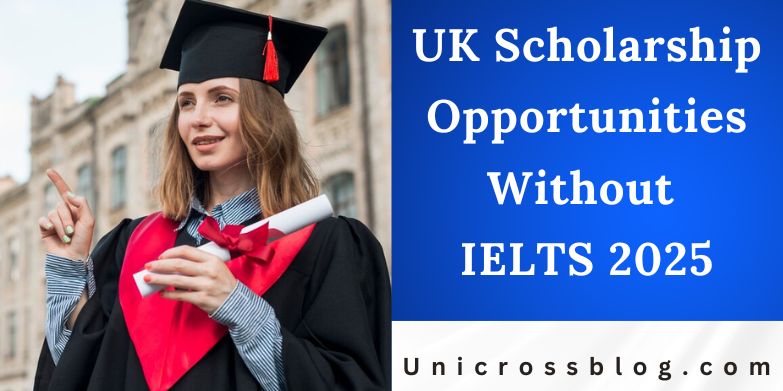Pursuing higher education in the United Kingdom remains a coveted goal for international students, drawn by its prestigious universities, cutting-edge research, and rich cultural tapestry. However, the International English Language Testing System (IELTS) often presents a hurdle due to its cost, rigorous preparation, and time demands. For 2025, a growing number of UK scholarships and institutions are removing this barrier by waiving IELTS requirements, making education more accessible for talented students worldwide.
Alternatives such as English proficiency certificates from previous institutions, prior education in English-medium schools, or other tests like TOEFL, PTE Academic, or the Duolingo English Test are increasingly accepted. This shift reflects a broader commitment to inclusivity, enabling students from non-English-speaking backgrounds to access world-class opportunities.
The UK’s scholarship landscape for 2025-2026 is vibrant, offering hundreds of fully funded and partial awards for undergraduate, master’s, and PhD programs across disciplines like science, technology, engineering, mathematics (STEM), humanities, law, business, and creative arts. These scholarships often cover tuition fees, living stipends, accommodation, travel, and health insurance, alleviating financial burdens.

Major Scholarship Programs
1. GREAT Scholarships 2025-2026
The GREAT Scholarships, a collaboration between the British Council and UK universities, support one-year postgraduate taught programs across over 70 institutions in England, Wales, Scotland, and Northern Ireland. Approximately 200 awards are available, each providing £10,000 toward tuition fees. These scholarships span diverse fields, including engineering, environmental sciences, law, justice, and fine arts, and are open to students from 18 eligible countries, such as India, China, Nigeria, Brazil, and Thailand. The program emphasizes cultural exchange and aims to foster future leaders who will contribute to their home countries’ development.
Eligibility requires a bachelor’s degree with strong academic performance (typically equivalent to a UK 2:1 or higher), relevant work or volunteer experience, and proof of English proficiency through alternatives like a medium-of-instruction certificate from a prior institution or tests like TOEFL. There’s no age restriction, but applicants must demonstrate intent to return home post-study to apply their skills.
2. Commonwealth Scholarships 2025
Funded by the UK Foreign, Commonwealth & Development Office (FCDO), Commonwealth Scholarships are among the most prestigious fully funded awards for students from over 50 Commonwealth nations, including Pakistan, Bangladesh, Kenya, Malaysia, and Jamaica. Targeting master’s and PhD candidates, these scholarships support studies aligned with sustainable development goals, such as climate resilience, global health, education, and gender equality. Around 400 awards are offered annually across any UK university.
Eligibility includes citizenship in a Commonwealth country, a bachelor’s degree with upper second-class honors (for master’s) or a master’s with distinction (for PhD), and at least two years of relevant professional or research experience. English proficiency can be demonstrated through a certificate confirming prior education in English or alternative tests—no IELTS is required if your academic background satisfies the university’s language criteria. Benefits include full tuition, a monthly living allowance (£1,236 outside London, £1,516 in London), economy return airfare, thesis grants up to £3,000, and family allowances in specific cases.
3. Chevening Scholarships 2025-2026
Chevening, the UK’s flagship global scholarship program, is funded by the FCDO and targets emerging leaders for one-year master’s degrees at over 150 UK universities. Open to applicants from more than 160 countries, it supports any academic discipline, from public policy to artificial intelligence, and boasts a network of over 60,000 alumni worldwide. The program seeks candidates who can drive transformative change in their home countries.
To qualify, applicants need an undergraduate degree, at least two years of work experience (equivalent to 2,800 hours, including volunteering or internships), and demonstrated leadership potential through essays and interviews. IELTS is waived if candidates provide evidence of English-medium education, such as a degree certificate, or complete a university-approved pre-sessional English course. The application process requires a compelling personal statement and three professional or academic references. Benefits cover full tuition, a monthly stipend (£1,200-£1,516 depending on location), travel costs, an arrival allowance, and visa expenses.
4. British Council Scholarships (Including Women in STEM)
The British Council offers fully funded scholarships for master’s studies, with a dedicated stream for women in STEM from partner countries like India, Indonesia, Turkey, Egypt, and Vietnam. These awards, offered at top universities like Imperial College London, the University of Edinburgh, and the University of Manchester, align with UN Sustainable Development Goals, particularly gender equality and scientific innovation. Broader British Council scholarships are available for all genders across various fields.
Eligibility for the Women in STEM variant requires female applicants with a relevant bachelor’s degree, a strong academic record, and a commitment to advancing STEM careers. General British Council scholarships have similar criteria but are open to all. English proficiency can be proven via alternatives like Duolingo scores, TOEFL, or a notarized certificate from a previous English-medium institution. Benefits include full tuition, living expenses (£1,200+ per month), return flights, and accommodation support.
5. University-Specific Scholarships
Several UK universities offer merit-based scholarships that waive IELTS requirements, focusing on academic excellence and potential:
-
University of Glasgow Graduate Scholarship: Provides £15,950 for master’s students, covering tuition and living costs. Open to all international students, it accepts English proficiency proof via prior studies or alternative tests. Deadlines fall between February and March 2025.
-
University of East Anglia International Scholarships: Offers up to £4,000 for undergraduate and postgraduate students across disciplines. A medium-of-instruction certificate or TOEFL score suffices for language requirements. Applications close by January 2025.
-
University of Southampton Vice Chancellor’s Scholarships: Fully funds PhD programs for up to four years, emphasizing research potential. IELTS is not required if candidates provide evidence of English-medium education. Deadlines vary, typically November 2024 to February 2025.
-
University of Aberdeen Global Scholarships: Awards £8,000 toward master’s tuition in fields like energy, health, and humanities. TOEFL or a university-issued proficiency letter is accepted. Apply by March 2025.
These scholarships often require a tailored personal statement, a detailed CV, and two to three academic or professional references. Universities may also conduct interviews to assess fit.
READ ALSO: Fully Funded Scholarship Opportunities in Oceania 2025
FAQs
Can I apply for UK scholarships without any English test?
Yes, many scholarships and universities accept alternatives like a certificate confirming your prior education was in English. Some offer pre-sessional English courses to meet language requirements.
Are these scholarships limited to students from developing countries?
No, while programs like Commonwealth focus on member nations, others like GREAT and university-specific awards are open to all international students based on merit.
What if I don’t win a full scholarship?
Partial funding options, like GREAT (£10,000) or university bursaries (£2,000-£8,000), are available. International students can also work part-time (up to 20 hours per week) on a student visa to offset costs.
How competitive are these scholarships?
Highly competitive—Chevening’s success rate is 2-3%, and Commonwealth awards around 400 of thousands of applicants. Strong essays, early applications, and unique personal stories improve your chances.
Can scholarships cover dependents?
Most cover only the student, but some, like Commonwealth, offer limited family allowances. Check specific terms, as additional visa and living costs may apply.
Do I need a specific degree grade?
Most require a UK 2:1 equivalent (60-70% or GPA 3.0/4.0) for master’s and a master’s with distinction for PhD. Check university-specific grading scales.
What documents are typically required?
A personal statement, CV, academic transcripts, passport copy, two to three references, and an English proficiency certificate (if applicable). Some may request a research proposal for PhD programs.







